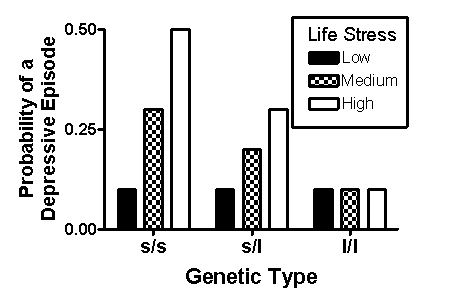Use the following to answer questions
Scenario I
The following scenario is based on and presents fabricated data consistent with the following study:
Caspi,A. ,Sugden,K. ,Moffitt,T.E. ,Taylor,A. ,Craig,I.W. ,Harrington,H. ,McClay,J. ,Mill,J. ,Martin,J. ,Braithwaite,A. ,and Poulton,R.(2003) .Influence of life stress on depression: Moderation by a polymorphism in the 5-HTT gene.Science,301(5631) ,386-389.
The serotonin transporter gene codes for the serotonin transporter,a protein that transports serotonin from the synapse to the presynaptic neuron.Several polymorphisms of the gene exist,including a "short" (s) and a "long" (l) variation.As humans receive one copy of the gene from each parent,people can be grouped into three groups based on this genetic variation: s/s (two copies of the short gene) ,s/l,and l/l.Caspi et al.(2003) interviewed participants in each of these groups and asked them a wide range of questions to determine both the degree of exposure to stress and the number of depressive episodes participants had experienced in their lives.Fabricated results consistent with their major findings are shown in Figure 3.1.
Figure 3.1 
-(Scenario I) Which statement is NOT true about the relationship between genetic variation and depression under conditions of high stress?
Definitions:
Organizational Culture
The common values, attitudes, and standards that affect how employees within an organization think, feel, and act.
Benchmark Jobs
Positions that are standardized across organizations and industries, used as reference points for setting wage scales and job evaluations.
Market Pay Policy
A compensation strategy that aligns employee salaries with the going rate for similar roles in the external job market.
Pay Survey Data
Information collected from various businesses on salary and benefits, used to benchmark and determine competitive salary ranges and compensation plans.
Q27: The extent to which the frequency of
Q140: Referred pain is the result of A-delta
Q156: Umami taste receptors respond most to sodium
Q156: A bathroom scale cannot detect the difference
Q166: Wally wants to see if room temperature
Q195: Research ethics boards (REBs)ensure that data are
Q221: Which activity is NOT a function of
Q262: The thalamus does NOT receive information from:<br>A)sight.<br>B)sound.<br>C)smell.<br>D)touch.
Q369: In an early experiment,stimulating the reticular formation
Q517: A participant is shown two flash cards,one